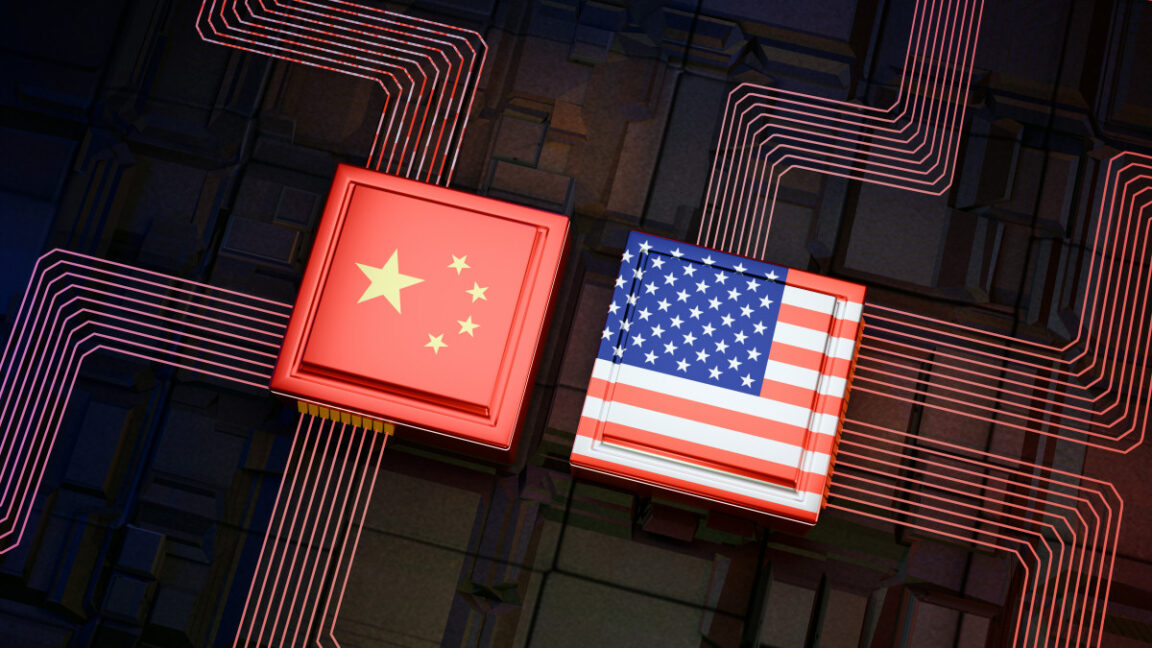
ARSTECHNICA.COM
Amid Trump tariff chaos, Nvidia launches AI chip production on US soil
kissing the ring?
Amid Trump tariff chaos, Nvidia launches AI chip production on US soil
New announcement seems aimed at appeasing Trump, signals company shift.
Benj Edwards
–
Apr 14, 2025 11:55 am
|
2
Credit:
Wong Yu Liang
Credit:
Wong Yu Liang
Story text
Size
Small
Standard
Large
Width
*
Standard
Wide
Links
Standard
Orange
* Subscribers only
Learn more
Nvidia announced plans today to manufacture AI chips and build complete supercomputers on US soil for the first time, commissioning over one million square feet of manufacturing space across Arizona and Texas. The politically timed move comes amid rising US-China tensions and the Trump administration's push for domestic manufacturing.
Nvidia's announcement comes less than two weeks after the Trump administration's chaotic rollout of new tariffs and just two days after the administration's contradictory messages on electronic component exemptions.
On Friday night, the US Customs and Border Protection posted a bulletin exempting electronics including smartphones, computers, and semiconductors from Trump's steep reciprocal tariffs. But by Sunday, Trump and his commerce secretary Howard Lutnick contradicted this move, claiming the exemptions were only temporary and that electronics would face new "semiconductor tariffs" in the coming months.
Nvidia says it has already begun producing its Blackwell chips at Taiwan Semiconductor Manufacturing Co's (TSMC) facilities in Phoenix, Arizona. Until now, the company's AI chips have been manufactured exclusively in Taiwan, presenting geopolitical risks to the supply chain.
The company is also setting up supercomputer manufacturing plants in Texas—partnering with Foxconn in Houston and Wistron in Dallas, with mass production expected to ramp up within 12 to 15 months.
"The engines of the world's AI infrastructure are being built in the United States for the first time," said Jensen Huang, Nvidia's founder and CEO in a news release. "Adding American manufacturing helps us better meet the incredible and growing demand for AI chips and supercomputers, strengthens our supply chain, and boosts our resiliency."
The TSMC facility in Phoenix, Arizona.
Credit:
The Washington Post via Getty Images
For chip packaging and testing operations, Nvidia is collaborating with Amkor and SPIL in Arizona. The supply chain for building the kinds of advanced GPUs that accelerate training and running AI models requires advanced manufacturing, packaging, and testing technologies that each partner works together to provide.
The development also comes days after Nvidia reportedly avoided export controls on its H20 chip by striking a domestic manufacturing deal with the Trump administration. The H20 is Nvidia's most powerful AI chip that can still be legally exported to China under current US restrictions; it's designed with reduced specifications to comply with export controls while maintaining compatibility with Nvidia's CUDA platform. According to reporting from TechCrunch and NPR, the H20, which can still be exported to China, was spared after Huang promised to invest capital into components for US-based AI data centers.
Half-trillion dollar gamble amid policy chaos
Nvidia's new US manufacturing initiative is ambitious in scope—the company aims to produce up to half a trillion dollars of AI infrastructure in the United States over the next four years. The company claims its efforts could create "hundreds of thousands" of jobs and drive "trillions of dollars" in economic activity in the coming decades.
However, given the uncertainty surrounding domestic and international trade policy under the current US administration, it's difficult to say whether those plans will actually come to pass exactly as envisioned today.
Trump has reportedly pressured TSMC directly, telling the company it would face a tariff of up to 100 percent if it didn't build new chip factories in the US. As TechCrunch notes, retaliatory tariffs on Chinese parts threaten the supply of raw materials to build chips in America, and the US lacks the necessary quantity of skilled manufacturing workers for assembling chips. The Trump administration's moves to undermine the CHIPS Act could further deter investments from semiconductor giants.
Significant questions remain about the viability of full production onshoring for Nvidia chips. Reports from December indicated that while front-end processing of Blackwell chips could take place in Arizona, the chips might still need to be shipped to Taiwan for advanced packaging using TSMC's chip-on-wafer-on-substrate (CoWoS) technology, which isn't yet available at the Arizona facilities.
While Nvidia highlights potential US job creation in its announcement, the company also plans to use its own technologies in these facilities, including "NVIDIA Omniverse to create digital twins of factories and NVIDIA Isaac GR00T to build robots to automate manufacturing." This suggests the company intends to incorporate significant automation in its US manufacturing operations.
Benj Edwards
Senior AI Reporter
Benj Edwards
Senior AI Reporter
Benj Edwards is Ars Technica's Senior AI Reporter and founder of the site's dedicated AI beat in 2022. He's also a tech historian with almost two decades of experience. In his free time, he writes and records music, collects vintage computers, and enjoys nature. He lives in Raleigh, NC.
2 Comments
0 التعليقات
0 المشاركات
62 مشاهدة


